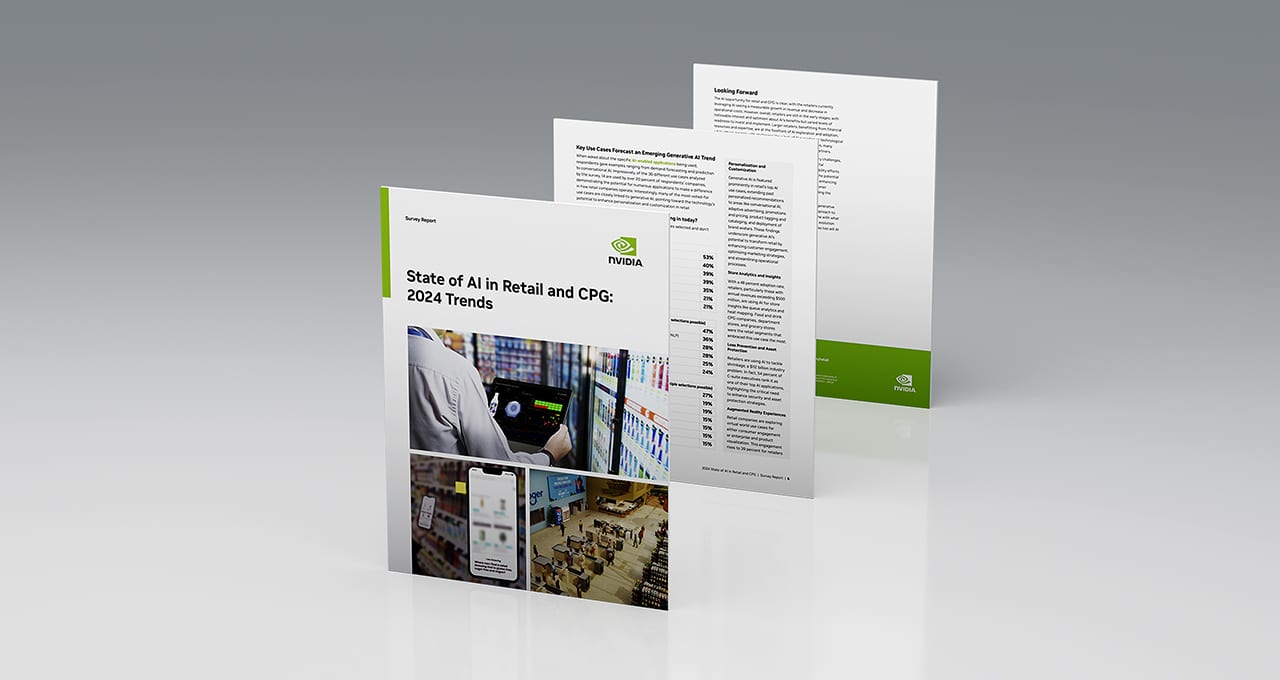
The retail industry is in the midst of a major technology transformation, fueled by the rise in AI.
With the highest potential for AI and analytics among all industries, the retail and consumer packaged goods (CPG) sectors are poised to harness the power of AI to enhance operational efficiency, elevate customer and employee experiences and drive growth. As such, it’s crucial to stay ahead of the curve by anticipating potential trends that aim to change the retail game.
NVIDIA’s first annual “State of AI in Retail and CPG” survey — conducted among industry professionals — provides insights into the state of AI adoption in retail, its impact on revenue and costs and the emerging trends shaping the future of the industry.
With more than 400 respondents globally, including C-suite leaders and other executives, general managers and individual contributors, the survey consisted of questions covering a range of AI topics, top use cases, biggest challenges, infrastructure investment initiatives and deployment models.
Improving Operational Efficiencies Is a Top Priority
To stay ahead in a highly dynamic market, retailers are actively considering how AI can help them meet evolving customer preferences, address labor shortages and drive sustainability efforts. AI has already proved to be a game-changer for retailers, with 69% reporting an increase in annual revenue attributed to AI adoption. Additionally, 72% of retailers using AI experienced a decrease in operating costs.
AI is enhancing operational efficiency, elevating customer experiences and driving growth. The top five current AI use cases were as follows:
- Personalized customer recommendations
- Store analytics and insights
- Loss prevention and asset protection
- Augmented reality experiences
- Automated marketing content generation
While retailers are actively implementing AI, there are still areas they plan on exploring. These include further investing in AI infrastructure to overcome challenges related to inadequate technology and lack of AI talent, exploring the potential of the metaverse for consumer engagement and operational efficiency while also leveraging AI for brick-and-mortar stores to provide convenience and personalized customer experiences, transforming customer experiences using generative AI, and ensuring data privacy and protection in generative AI adoption.
Generative AI Is Changing Customer Experiences
Generative AI prominently emerged in several of the top AI use cases for retail. The use cases ranged from multimodal shopping advisors for personalized product recommendations; adaptive advertising, promotions and pricing; product tagging and cataloging; identification of similar and complementary products; as well as deployment of brand avatars for automated customer service.
Retailers recognized the transformative potential of generative AI, with 86% expressing a desire to use it to enhance customer experiences. Respondents acknowledged that incorporating AI into business practices and solutions could revolutionize customer engagement, optimize marketing strategies and streamline operational processes.
Staying Ahead With an Omnichannel Approach
To stay competitive, the survey indicated the importance of an omnichannel approach that integrates numerous online and offline channels to provide consumers with a consistent experience.
The results showed that ecommerce was the most used channel, with 79% of retailers actively participating. Mobile applications also gained traction, with over half of retailers using them to bridge the gap between digital and physical shopping experiences.
Despite the rise in digital shopping, 30% of respondents say physical stores have the biggest revenue growth opportunity (ranked second behind ecommerce) and remain the channel with the most AI use cases for retailers. Given the emphasis on intelligent stores and their central role in the omnichannel experience, use cases such as store analytics and loss prevention will continue to be critical investments.
Investing in AI Infrastructure
While AI adoption is still in its early stages, retailers are committed to increasing their AI infrastructure investments. Over 60% of respondents plan to boost their AI investments in the next 18 months. This commitment reflects the industry’s recognition of the technology’s potential to enhance operational efficiency, reduce costs, elevate customer experiences and drive growth.
Download the “State of AI in Retail and CPG: 2024 Trends” report for in-depth results and insights.
Explore NVIDIA’s AI solutions and enterprise-level AI platforms for retail at www.nvidia.com/retail.
